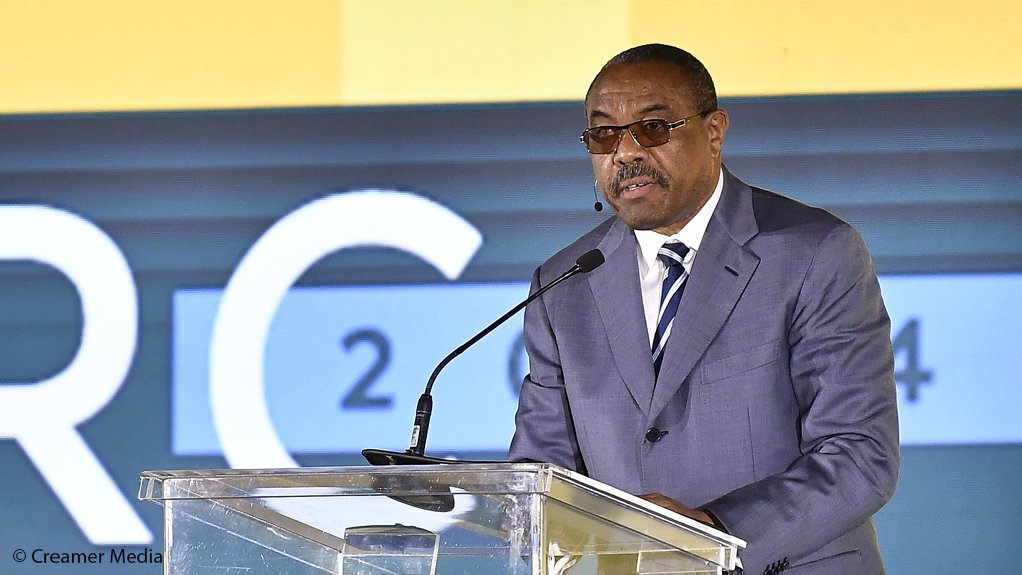JOHANNESBURG (miningweekly.com) – Recycle like there’s no tomorrow were the urging words flashed across the large screen at the thirteenth Oppenheimer Research Conference, where long-time former diamond mining luminary Nicky Oppenheimer declared that it is nature that is calling the shots when it comes to climate change mitigation prospects.
Oppenheimer was followed by keynote speaker, Hailemariam Desalegn, the former Prime Minister of Ethiopia, who told the 450 scientists present: “The clock is ticking. To confront this crisis, we must embrace radical collaboration and science without boundaries.” (Also watch attached Creamer Media video.)
Regarding this Namibian PhD student’s question: “What is more important. That we, as Homo sapiens, resolve climate change, or that we resolve the relationship between man and nature”, Oppenheimer had this response: “It's more important that we resolve the relationship between man and nature, because if we can do that, climate change will not exist.
“On the other hand, you can see a situation where scientists could resolve climate change, but by destroying nature. In resolving that issue between man and nature, we have to find a way to cohabit, to work together,” Oppenheimer urged at the event covered by Engineering News & Mining Weekly.
Meanwhile, former water and environmental engineer Desalegn declared climate change and nature loss “the greatest existential threat we’ll collectively face”.
Already, in Africa alone, 6 400 animal species and 3 100 plants are at risk of extinction, with vertebrates down 30% since 1970.
Soil erosion, salinisation, pollution and loss of vegetation have degraded a fifth of Africa's land surface and the Congo basin, one of the world’s lungs, is losing up to 1.2-million hectares of tropical forest a year, resulting in a 30% decline in tree cover.
Meanwhile, the blue economy, once projected to grow to $405-billion by 2030, is now in a 30% contraction owing to mass coral bleaching by climate-influenced ocean acidification, plastics pollution and poleward marine life migration.
Climate change and the nature loss span countries and continents, “and therefore our solutions must transcend national interests and political divides”, Desalegn pointed out.
“The future of our planet hinges on our ability to radically collaborate across borders, disciplines and sectors.
“The effects of climate change and nature loss know no borders. They are global phenomena, spanning countries and continents, and therefore our solutions must transcend national interests and political divides.
“The future of our planet hinges on our ability to collaborate radically across borders, disciplines and sectors,” Desalegn highlighted.
Being encouraged is the seamless working together of scientists the world over, the empowering of citizens to take part in scientific enquiry and action and the removal of the barriers hindering the free flow of information and expertise.
Wanted is the amplification of the voices of Indigenous peoples and local communities whose relationship with nature provides valuable insight.
“International financing must be seen as an investment, not a cost, one that will create high economic returns and avoid massively accelerating future costs associated with the global existential threat of climate change and nature loss.
“Fundamentally, if we want to maintain a livable planet, urgent investment is needed now to conserve intact ecosystems, mainly in the developing world.
“For too long, the world stood by and did nothing, and we are now in the eleventh hour. Our planet's future depends on our willingness to work together, to transcend boundaries and to put our shared humanity first.
“Together, we can create a world where innovation flourishes, where knowledge flows freely, and where humanity learns to coexist with nature rather than exploit it.
“Together, we can avert further climate catastrophe, make peace with nature,” Desalegn advocated.
EMAIL THIS ARTICLE SAVE THIS ARTICLE ARTICLE ENQUIRY FEEDBACK
To subscribe email subscriptions@creamermedia.co.za or click here
To advertise email advertising@creamermedia.co.za or click here












